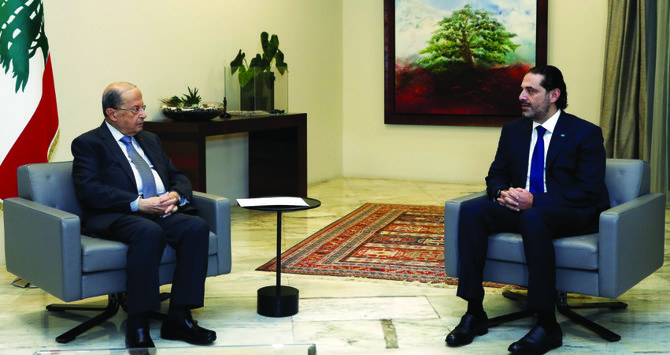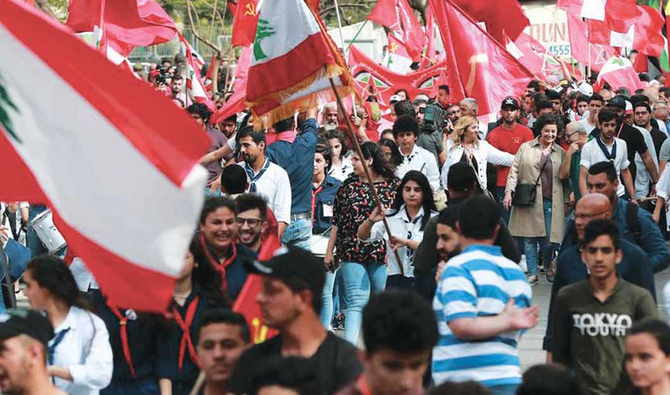By ASSOCIATED PRESS LEIDSCHENDAM, Netherlands — A United Nations-backed tribunal sentenced a member of the Hezbollah militant group to life in prison …

by NAJIA HOUSSARI -- arabnews -- BEIRUT: Hopes that Lebanese Prime Minister-designate Saad Hariri’s new government would be confirmed quickly were dashed on Thursday when President Michel Aoun presented his own counter-proposal to Hariri’s suggested Cabinet lineup of 18 ministers. Hariri stressed that he had selected “specialists with no partisan affiliations.” Mustafa Alloush, the vice president of Hariri’s Future Movement party, said: “Hariri has carried out his constitutional duties, and the ball is now in the court of the president and his team, especially his brother-in-law, the head of the Free Patriotic Movement, MP Gibran Bassil.” However, a statement issued by the Presidency of the Republic after Aoun’s meeting with Hariri said that Aoun “handed Hariri in return an integrated government proposal which includes a distribution of portfolios based on clear principles.” This indicates, according to commentators, that Lebanon’s “political dispute remains unchanged.”
Alloush said: “Hariri submitted an integrated government lineup of independent, nonpartisan ministers. It represents most of the sectarian components and respects the unity of standards as the political forces demanded, but it seems that President Aoun’s team, and especially Bassil, insist on being the obstructing third of the government while keeping specific ministries, such as the Ministry of Energy, and this is what Hariri did not and will not accept.” He added: “Hariri suggested Shiite ministers that would provoke neither Hezbollah nor the Amal movement.” Sources close to Aoun said that the president was “surprised that Hariri named all the ministers, including Christians, without consulting him.”
ZEINA KARAM -- BEIRUT (AP) — The Lebanese prosecutor probing last summer’s port explosion in Beirut filed charges on Thursday against the caretaker prime minister and three former ministers, accusing them of negligence that led to the death of hundreds of people, Lebanon’s official news agency said. The four are the most senior individuals to be indicted so far in the investigation, which is being conducted in secrecy. And though it is too early to predict whether any of the four would end up on trial, the development was significant in Lebanon, where a culture of impunity has prevailed for decades, including among the entrenched political elites. Judge Fadi Sawwan, the prosecutor responsible for the investigation, filed the charges against Hassan Diab and former Finance Minister Ali Hassan Khalil, as well as Ghazi Zeiter and Youssef Fenianos, both former ministers of public works. All four were charged with carelessness and negligence leading to death over the Aug. 4 explosion at Beirut's port, which killed more than 200 people and injured thousands.
The explosion was caused by the ignition of a large stockpile of explosive material that had been stored at the port for six years, with the knowledge of top security officials and politicians who did nothing about it. Anger has been building up over the slow investigation, lack of answers and the fact that no senior officials have been indicted. About 30 other security officials and port and customs officials have been detained in the probe so far. Diab is a former professor at the American University of Beirut who became prime minister late last year. Although he served as minister of education from 2011-14, he is considered to be an outsider to the political ruling class that has run Lebanon since the end of the 1975-90 civil war. Since the shipment of ammonium nitrates arrived in Lebanon in late 2013, four prime ministers have been in office. It was not clear why Sawwan has singled out Diab, who was prime minister for less than a year among the ex-premiers who have held the post while the nitrates were improperly stored at a port warehouse, a ticking bomb.

by NAJIA HOUSSARI - arabnews -- BEIRUT: Thousands of public and private-sector workers in Lebanon are expected to down tools next week in a national strike over crippling government spending cuts. Members of the country’s General Labor Union, which includes 43 unions and federations, will join a walkout on Wednesday in protest at the latest austerity measures. Union leader, Bechara Al-Asmar, told Arab News: “This national strike is the beginning of the broadest moves the country will witness against the removal of state subsidies for basic materials. “We are shouting in everyone’s face. We cannot stand by. If they (the country’s political leaders) form a government, there is no need to strike, but what is happening is further deterioration. “The poverty rate in Lebanon, according to international statistics, has reached 75 percent, and these people receive 1 million (Lebanese) pounds ($660), which is no longer sufficient to pay an electricity bill, while the extreme poverty rate has risen to 40 percent. “In the tourism sector alone, the total number of people who have lost their jobs has reached 110,000, and if banks implement the Central Bank’s circular for merging, 10,000 employees will become unemployed and there will be no job opportunities for them in light of the closure of other institutions,” Al-Asmar said.
There were angry street protests in Sidon following an announcement by Ali Ibrahim, head of the Union of Bakeries Syndicates, that the state had stopped subsidizing flour. Demonstrators blocked main roads and in Hermel tires were set alight outside the government palace. One protester told Arab News: “I used to buy a thyme pie (a cheap popular food) for 1,000 Lebanese pounds. Today, after announcing the lifting of subsidies, they went up to 2,500 pounds. How can the poor survive? What awaits us next?” During a press conference, Shadi Al-Sayed, head of the Public Drivers Syndicate in northern Lebanon, said: “The spark of anger will be from Tripoli if the ruling authority in Lebanon decides to kill the citizen in his livelihood.” He warned of street protests until “matters returned to normal.”
Khazen History


Historical Feature:
Churches and Monasteries of the Khazen family

St. Anthony of Padua Church in Ballouneh
Mar Abda Church in Bakaatit Kanaan
Saint Michael Church in Bkaatouta
Saint Therese Church in Qolayaat
Saint Simeon Stylites (مار سمعان العامودي) Church In Ajaltoun
Virgin Mary Church (سيدة المعونات) in Sheilé
Assumption of Mary Church in Ballouneh
1 - The sword of the Maronite Prince
2 - LES KHAZEN CONSULS DE FRANCE
3 - LES MARONITES & LES KHAZEN
4 - LES MAAN & LES KHAZEN
5 - ORIGINE DE LA FAMILLE
Population Movements to Keserwan - The Khazens and The Maans
ما جاء عن الثورة في المقاطعة الكسروانية
ثورة أهالي كسروان على المشايخ الخوازنة وأسبابها
Origins of the "Prince of Maronite" Title
Growing diversity: the Khazin sheiks and the clergy in the first decades of the 18th century
Historical Members:
Barbar Beik El Khazen [English]
Patriach Toubia Kaiss El Khazen(Biography & Life Part1 Part2) (Arabic)
Patriach Youssef Dargham El Khazen (Cont'd)
Cheikh Bishara Jafal El Khazen
Patriarch Youssef Raji El Khazen
The Martyrs Cheikh Philippe & Cheikh Farid El Khazen
Cheikh Nawfal El Khazen (Consul De France)
Cheikh Hossun El Khazen (Consul De France)
Cheikh Abou-Nawfal El Khazen (Consul De France)
Cheikh Francis Abee Nader & his son Yousef
Cheikh Abou-Kanso El Khazen (Consul De France)
Cheikh Abou Nader El Khazen
Cheikh Chafic El Khazen
Cheikh Keserwan El Khazen
Cheikh Serhal El Khazen [English]
Cheikh Rafiq El Khazen [English]
Cheikh Hanna El Khazen
Cheikha Arzi El Khazen
Marie El Khazen
